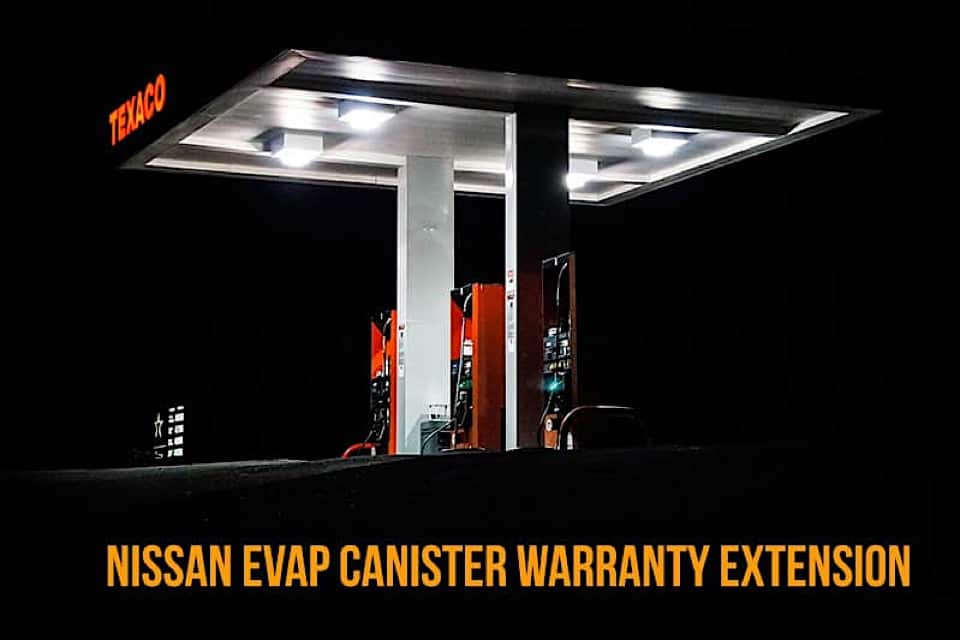EVAP System Clogs and Gas Spills Out
- The EVAP system in a ton of Nissan vehicles can get clogged.
- A clogged EVAP system can cause gas to splash back while filling up and will almost certainly cause your car to fail its next inspection.
- In Maych of 2017 Nissan announced a warranty extention to help with the problem.

If your EVAP system ever clogs up, this massive warranty extension is just the plunger you'll need:
"Nissan is calling it the "EVAP Emission Warranty Policy Enhancement" that will extend the evaporative emission vapor vent tube warranty to 15 years or 150,000 miles, whichever occurs first, if the tube is clogged."
The extension covers all 2003-2017 Nissan models (more info below). That's a lot of vapor tubes.
What is EVAP? ∞
EVAP stands for the evaporative emission control system.
It's job is to trap any gas vapors that are trying to escape the tank or fuel system in your vehicle. Those trapped vapors can be recirculated and used in the engine rather than polluting the environment.
There is a tube that sits between the fuel tank and the EVAP vapor canister. If that tube gets clogged up, Nissan says it can confuse the vehicle's software which means:
- It will trigger the check engine light
- It will probably stop your car from passing an emissions test
- Gas can spill out of the tank next time you go to fill-up
Nissan EVAP Emission Campaign ∞
In March 2017, Nissan announced their EVAP Canister Warranty Extension. In total, the automaker believes the extension covers about 12.5 million vehicles but stresses that vapor tube clogs are rare.
What does this mean for owners? Well, nothing if you haven't noticed a problem ... at least not yet. From CarComplaints.com:
"Nissan will mail owner notifications about the program and included with the letters are peel-off labels used to remind owners of the program. Nissan emphasizes the vehicles are perfectly safe to drive and there is no need to bring a vehicle to a dealer unless problems are noticed."
The warranty extension is now in place in case your EVAP system clogs up. Owners who have already had to pay for vent tube repairs, may be eligible for reimbursement.
Generations Where This Problem Has Been Reported
This problem has popped up in the following Nissan generations.
Most years within a generation share the same parts and manufacturing process. You can also expect them to share the same problems. So while it may not be a problem in every year yet, it's worth looking out for.
1st Generation 370Z
- Years
- 2009–2020
- Reliability
- 15th of 54
- PainRank™
- 2.46
- Complaints
- 52

3rd Generation Altima
- Years
- 2002–2006
- Reliability
- 53rd of 54
- PainRank™
- 40.42
- Complaints
- 1566
4th Generation Altima
- Years
- 2007–2012
- Reliability
- 52nd of 54
- PainRank™
- 39.02
- Complaints
- 1300

5th Generation Altima
- Years
- 2013–2018
- Reliability
- 54th of 54
- PainRank™
- 59.71
- Complaints
- 1484

1st Generation Frontier
- Years
- 1998–2004
- Reliability
- 20th of 54
- PainRank™
- 3.64
- Complaints
- 58
2nd Generation Frontier
- Years
- 2005–2019
- Reliability
- 38th of 54
- PainRank™
- 14.81
- Complaints
- 928

1st Generation Juke
- Years
- 2010–2017
- Reliability
- 32nd of 54
- PainRank™
- 9.14
- Complaints
- 167

1st Generation Leaf
- Years
- 2011–2017
- Reliability
- 21st of 54
- PainRank™
- 3.79
- Complaints
- 31

5th Generation Maxima
- Years
- 2000–2003
- Reliability
- 26th of 54
- PainRank™
- 5.87
- Complaints
- 97
6th Generation Maxima
- Years
- 2004–2008
- Reliability
- 50th of 54
- PainRank™
- 37.57
- Complaints
- 885

7th Generation Maxima
- Years
- 2009–2015
- Reliability
- 36th of 54
- PainRank™
- 11.83
- Complaints
- 234
8th Generation Maxima
- Years
- 2016–2020
- Reliability
- 18th of 54
- PainRank™
- 3.35
- Complaints
- 44

1st Generation Murano
- Years
- 2003–2007
- Reliability
- 47th of 54
- PainRank™
- 24.11
- Complaints
- 437
2nd Generation Murano
- Years
- 2009–2014
- Reliability
- 45th of 54
- PainRank™
- 20.36
- Complaints
- 252

3rd Generation Murano
- Years
- 2015–2020
- Reliability
- 28th of 54
- PainRank™
- 6.37
- Complaints
- 90

2nd Generation Pathfinder
- Years
- 1996–2004
- Reliability
- 16th of 54
- PainRank™
- 2.99
- Complaints
- 82
3rd Generation Pathfinder
- Years
- 2005–2012
- Reliability
- 49th of 54
- PainRank™
- 34.19
- Complaints
- 1510

4th Generation Pathfinder
- Years
- 2013–2020
- Reliability
- 41st of 54
- PainRank™
- 16.72
- Complaints
- 446

1st Generation Rogue
- Years
- 2008–2013
- Reliability
- 51st of 54
- PainRank™
- 37.99
- Complaints
- 669

2nd Generation Rogue
- Years
- 2014–2020
- Reliability
- 46th of 54
- PainRank™
- 22.56
- Complaints
- 431

4th Generation Sentra
- Years
- 1995–1999
- Reliability
- 7th of 54
- PainRank™
- 1.04
- Complaints
- 16
5th Generation Sentra
- Years
- 2000–2006
- Reliability
- 37th of 54
- PainRank™
- 12.09
- Complaints
- 323
6th Generation Sentra
- Years
- 2007–2012
- Reliability
- 40th of 54
- PainRank™
- 15.61
- Complaints
- 241

1st Generation Versa
- Years
- 2007–2011
- Reliability
- 48th of 54
- PainRank™
- 24.43
- Complaints
- 485

2nd Generation Versa
- Years
- 2012–2019
- Reliability
- 43rd of 54
- PainRank™
- 18.4
- Complaints
- 322

1st Generation Xterra
- Years
- 2000–2004
- Reliability
- 27th of 54
- PainRank™
- 6.27
- Complaints
- 92
2nd Generation Xterra
- Years
- 2005–2015
- Reliability
- 42nd of 54
- PainRank™
- 17.47
- Complaints
- 968

